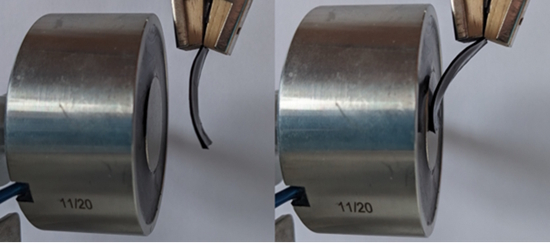Bioinspired, 3D Printed, Stimulus-responsive Hydrogels for Soft Robotics

Projektverantwortlicher: Vishal Gavande, Ph.D.
Many natural soft tissues can be actuated, i.e. controlled motion can be generated in response to an external stimulus. This is a continuous source of inspiration for soft robotics. The aim of this project is to mimic soft tissue actuation using synthetic polymer hydrogels. Hydrogels and soft tissues have many common properties, e.g., similar elastic moduli and water contents. Hydrogels with responsive components are thus ideal model systems for the design of synthetic actuators. Theses systems are autonomous, i.e. no “wiring” to a central control unit is required - all they need to respond is the specified external trigger. Our current project focuses on developing multi-stimulus responsive hydrogels from 3D printable inks that are shear-thinning and thixotropic. The image shows a magnetoresponsive hydrogel.
Neuere Veröffentlichungen:
- 3D Printing of Polymer Hydrogels—From Basic Techniques to Programmable Actuationhttps://advanced.onlinelibrary.wiley.com/doi/full/10.1002/adfm.202205345
- Biocompatible, 3D Printable Magnetic Soft Actuators – Ink Formulation, Rheological Characterization and Hydrogel Actuator Prototypeshttps://onlinelibrary.wiley.com/doi/full/10.1002/mame.202300322
- 3D Printable Magnetic Soft Actuators–Ink Formulation, Rheological Characterization, and Hydrogel Actuator Prototypeshttps://onlinelibrary.wiley.com/doi/full/10.1002/mame.202400431
